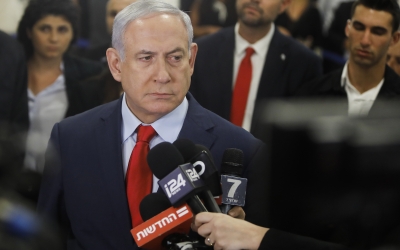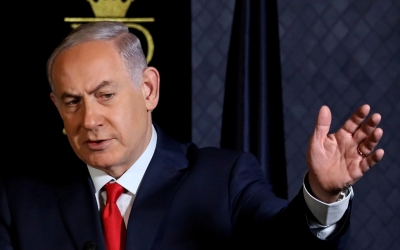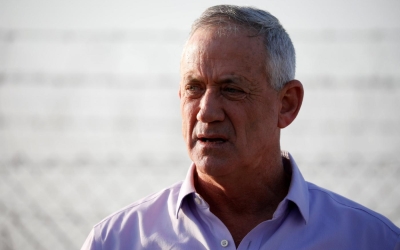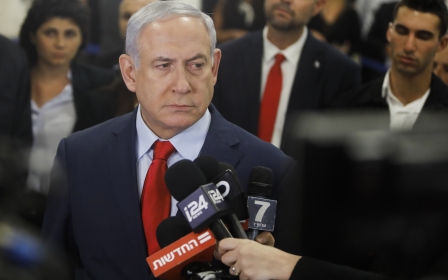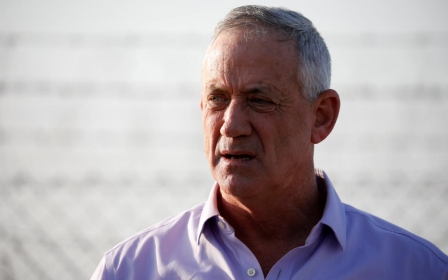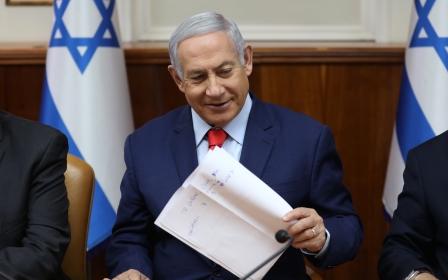Israel is heading for another parliamentary election. Why?
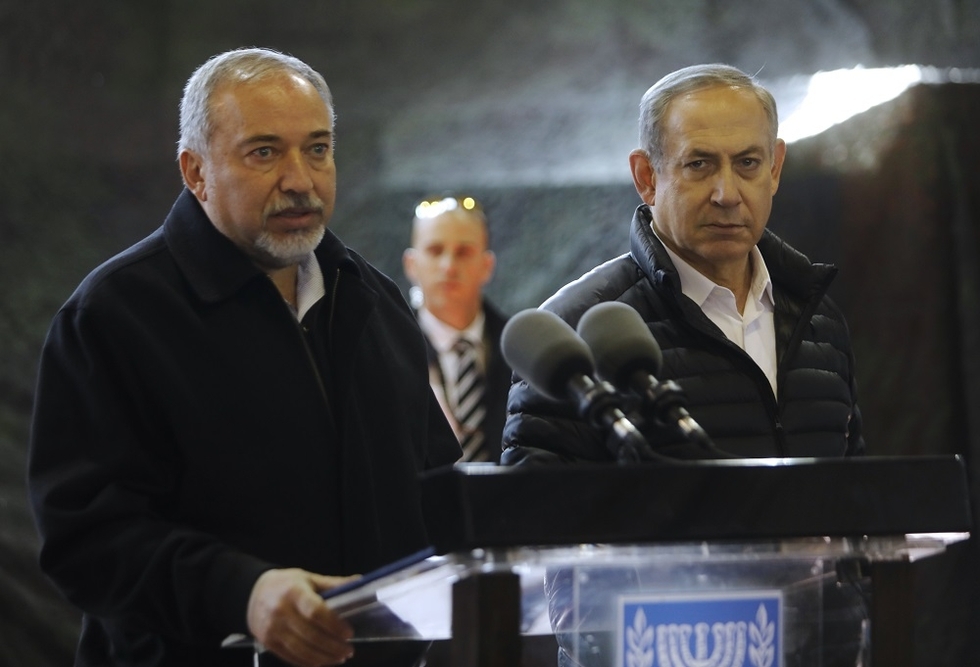
Israel will hold a new election on 17 September after parliament voted 74-45 to dissolve itself following Prime Minister Benjamin Netanyahu's failure to form a ruling coalition government before a midnight deadline on Wednesday.
Netanyahu's authority has suffered a major blow because he had confidently claimed victory in the last election on 9 April, but could not put together a ruling conservative bloc as he was widely expected to do.
The prime minister's Likud party, along with right-wing and religious parties expected to be Netanyahu's natural allies, had won a majority of 65 of 120 seats in last month's poll.
Israel’s political crisis: A timeline
+ Show - Hide14 November 2018
Defence Minister Avigdor Lieberman withdraws from Israel’s governing coalition in protest against ceasefire talks with Hamas, leaving Benjamin Netanyahu’s government with only a slight majority in parliament.
19 November 2018
After emergency talks, Netanyahu avoids a snap election when far-right Education Minister Naftali Bennett drops his threat to collapse the coalition if he is not made defence minister.
2 December 2018
Israeli police recommend corruption charges against Netanyahu for allegedly offering telecoms company Bezeg better contracts in exchange for positive coverage in a news website under the same owner.
24 December 2018
After resisting pressure and following weeks of infighting in his cabinet, especially over a military exemption bill affecting ultra-Orthodox Jews, Netanyahu calls a snap election for April 2019.
21 February 2019
Netanyahu’s strongest opponents, including three former military chiefs, launch the Blue and White political alliance aimed at ending the prime minister’s decade in power. The two strongest candidates, Benny Gantz and Yair Lapid, agree to rotate the role of premier if they win.
9 April 2019
Netanyahu wins a record fifth term as prime minister. Though Blue and White equalled the number of seats as his Likud party, the number of seats won by Netanyahu’s right-wing allies put him in the strongest position to form a government.
25 May 2019
Thousands of Israelis from all political parties protest against Netanyahu and suggestions his party will fight to grant him immunity against corruption charges
27 May 2019
Netanyahu vows to build a coalition despite his failure to secure an agreement more than a month after the election and with only 48 hours until the deadline to form a government passes. Lieberman refuses Netanyahu’s request to join the coalition.
29 May 2019
Netanyahu misses his deadline to form a coalition and the Israeli parliament votes for new elections on 17 September 2019.
The main reason for Netanyahu's failure to form a coalition was that he was unable to get the support of the far-right Yisrael Beitenu party, which won five Knesset seats last month under the leadership of his former defence minister, Avigdor Lieberman.
Yisrael Beitenu has been at odds with ultra-Orthodox parties Shas and United Torah Judaism over a military conscription bill - and Lieberman said he would not serve in a government alongside them.
New MEE newsletter: Jerusalem Dispatch
Sign up to get the latest insights and analysis on Israel-Palestine, alongside Turkey Unpacked and other MEE newsletters
That bill would make it mandatory for Haredi men studying the Torah to join Israel's armed forces, a requirement from which they have been exempted.
Lieberman has long said that all Israeli men must equally share the burden of military service.
On his Facebook page on Wednesday, Lieberman blamed Likud for the repeat election, saying the party had refused to vote on the ultra-Orthodox draft bill.
However, a few hours before the midnight deadline, Likud spokesman Jonathan Urich tweeted: "It's not conscription and it's not 'principles.' Lieberman wants to destroy Netanyahu. The rest is spin."
Although it is highly unlikely Lieberman could win the next election, the latest events appear to have greatly strengthened his position and he is likely to become the "kingmaker" following September's poll.
Some commentators have also seen Lieberman's actions as his attempt to strengthen his position in the race for the premiership once the Netanyahu era comes to an end.
Fifth election since 2009
While the dissolution prevented Netanyahu's worst-case scenario of Israeli President Reuven Rivlin selecting another person to try to form a government, it also sends the country into what is likely to be another divisive election campaign.
No single party has ever won an outright majority in the Knesset, making coalition governments the norm, but holding elections so close together will be unprecedented.
The dissolution also means Israel will now be holding its fifth election since 2009.
Netanyahu, who remains in office, is still set to become Israel's longest-serving prime minister in July, surpassing founding father David Ben-Gurion; and he has made it clear that he intends to run and win.
The stakes could not be higher for the 69-year-old premier, who faces three looming indictments for corruption.
Netanyahu has denied any wrongdoing in the cases and is due to argue at a pre-trial hearing at the beginning of October against the attorney-general's intention, announced in February, to indict him.
Public attention since the April election had been focused less on coalition-building and more on moves Netanyahu loyalists were planning in parliament to grant him immunity.
There is no doubt Netanyahu would have preferred a so-called snap election but Israeli election campaigns by law must last at least 90 days, hence the September date.
The new election date, coming just two weeks before the hearing, appears to scupper Netanyahu's chances of gaining immunity before the pre-trial, even if he were to win the poll.
Scenting weakness
Although Likud has so far rallied around Netanyahu, that may change if the membership scent weakness in a premier who could not assemble a coalition.
Gideon Saar and Israel Katz are possible rivals to Netanyahu from within Likud.
Ahead of the April election, Netanyahu said he would declare Israeli sovereignty over settlements in the occupied West Bank, a possible annexation, if he won another term.
His close personal relationship with US President Donald Trump is also likely to once again feature prominently in the campaign.
However, it is unclear how the domestic political turmoil will affect the prospects of the long-delayed US 'deal of the century' Middle East peace plan.
Netanyahu-Gantz re-run?
Netanyahu's closest opposition rival in the battle to become prime minister is again likely to be Benny Gantz.
A former Israeli chief of staff and a political novice, Gantz emerged as a serious rival to the premier in the April poll.
Born to Romanian and Hungarian Holocaust survivors, Gantz served in the military from 1977 to 2015, when he stepped down as its commander.
His newly formed centrist Blue and White party, which campaigned in April on a platform of clean government, peace and security, won 35 seats in the Knesset, the same as Likud.
Other high-profile Blue and White members are centre-left former finance minister Yair Lapid and Moshe Yaalon, a right-wing former defence minister.
Gantz has called for pursuing peace with the Palestinians while maintaining Israeli security interests.
He has indicated he would make territorial concessions towards the Palestinians, but has sidestepped the question of Palestinian statehood.
Among the smaller parties, Avi Gabbay, a former telecom chief, led the centre-left Labor party into a disastrous election, at which it slumped from 18 seats to six.
Gabbay, who refused an offer to join Netanyahu's coalition on Wednesday, has publicly backed a two-state solution with the Palestinians.
Labor's campaign in April stressed social and economic reform, as well as pursuing peace.
This article is available in French on Middle East Eye French edition.
Middle East Eye delivers independent and unrivalled coverage and analysis of the Middle East, North Africa and beyond. To learn more about republishing this content and the associated fees, please fill out this form. More about MEE can be found here.


